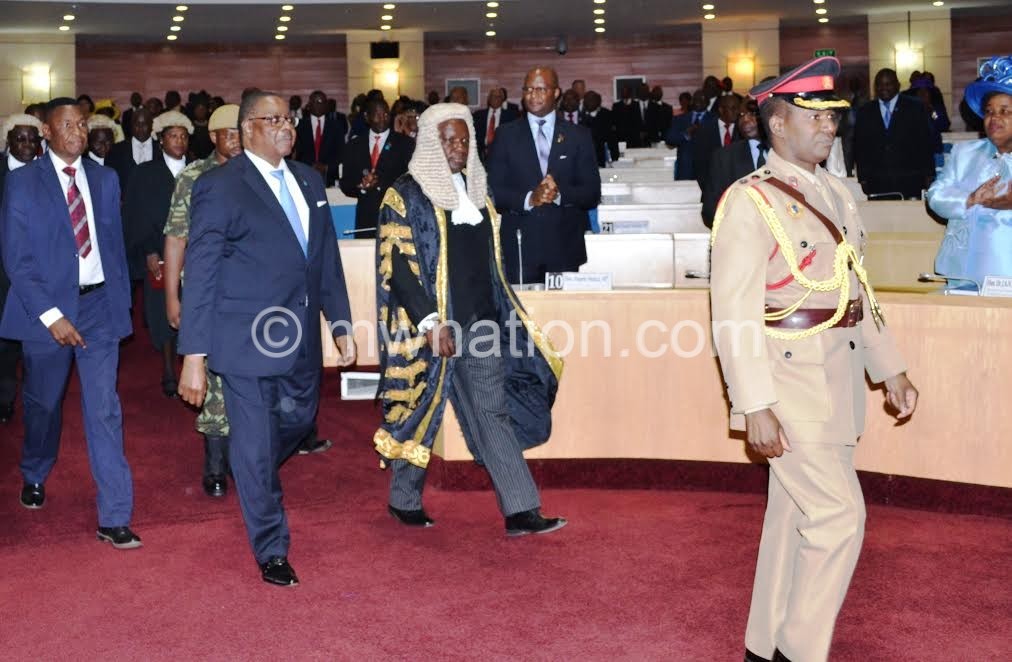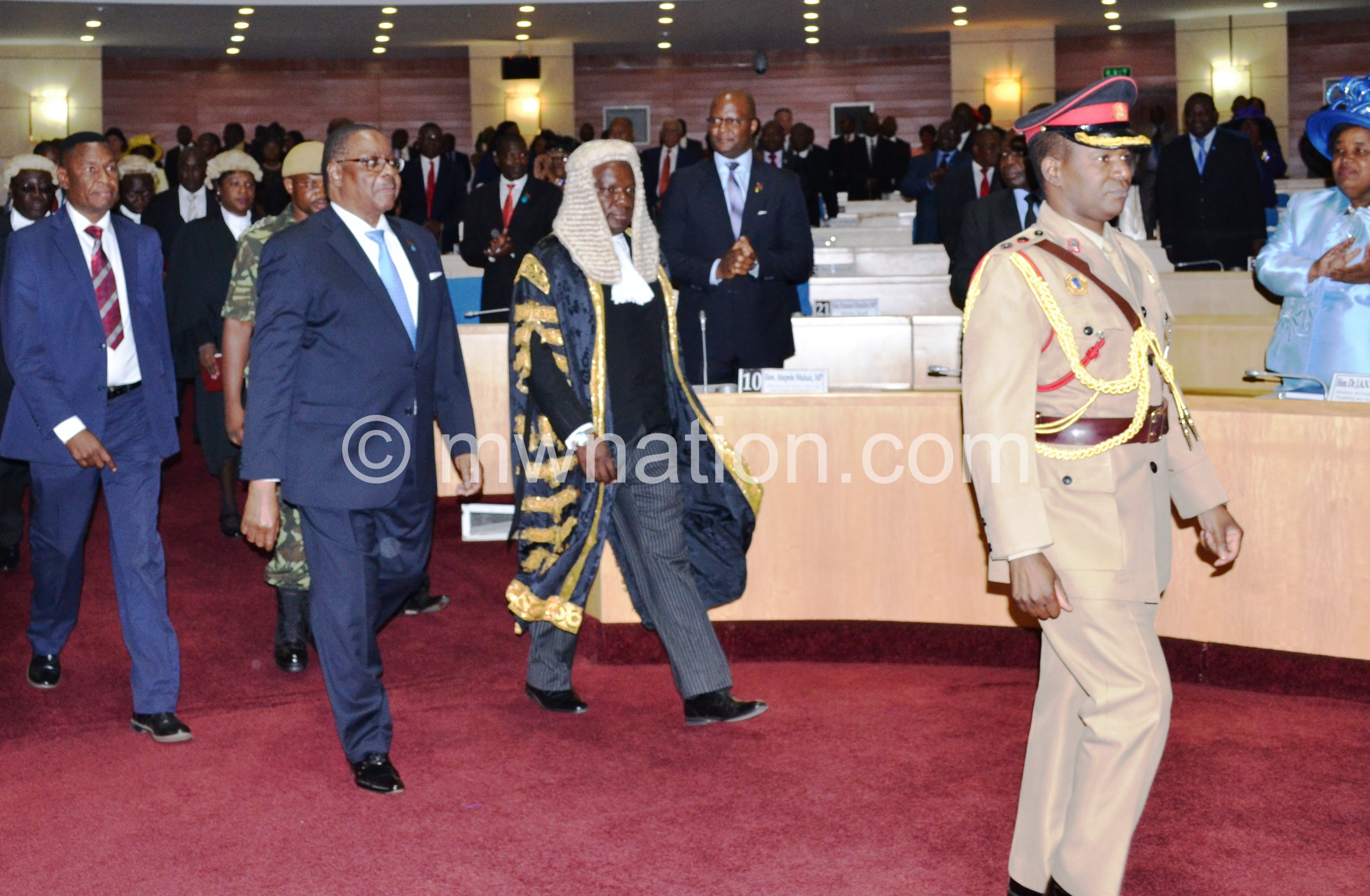APM avoids sticky issues in Sona
President Peter Mutharika yesterday delivered a State of the Nation Address (Sona) that avoided sticky issues such as electoral reforms and proposed legislative amendments and opening of Chancellor College, but opted to tout successes of the government over the past financial year.
In a statement that lasted approximately an hour and 20 minutes of patting his government on the back, Mutharika hyped the positive economic outlook buoyed by lowering maize prices and inflation, expressing his determination that the economy would grow.

A defensive Mutharika took an opportunity to hit back at naysayers on the economic progress of the country.
“Let those who see emptiness in everything keep their empty rhetoric while you and I agree that we are making progress. But let those who listen, listen. Even the World Bank and the International Monetary Fund agree that we are on the right path. Malawians who are proud of this country have every reason to be optimistic,” he said.
However, Mutharika did not acknowledge that some Malawians remain disenfranchised after government failed to fund by-elections in two constituencies and several wards.
Themed ‘Harnessing Economic Gains for Sustainable Socio-Economic Development’, Mutharika focused on strategic achievements the government had made as well as plans for the year.
Where some stakeholders wanted to hear commitment to good governance and strategic direction on the future of the electoral reforms ahead of the 2019 elections, Mutharika made no mention of this.
The plans did not include commitment to implementing findings of the Special Law Commission on the Review of Electoral Law, which recommended the enactment of six pieces of legislation, among them, one which would provide for the transition between one President to another.
On the list of Bills the government is to prepare the following are absent: Constitution (Amendment), Electoral Commission (Amendment), Presidential, Parliamentary and Local Government Elections, Assumption of the Office of President (Transitional Arrangement) and Referendum.
Instead, Mutharika said the government had produced and would table in the 2017/18 financial year new Bills, namely: Plant Breeders’ Rights Bill and Plant Protection Bill; Green Belt Initiative Authority Bill; Warehouse Receipts Systems Bill; Trade Remedies Bill and Civil Aviation Bill.
“Mr. Speaker, Sir, Government plans to adopt key policy and legislative instruments such as the National Seed Policy, Fertiliser Policy, Plant Breeders Rights Bill and Plant Protection Bill with a view to further improve the agriculture sector,” he said.
In touting successes of the past year on education, Mutharika narrated successes in the disbursement of loans to 7 500 students, rehabilitation of national secondary schools and commencement of construction of school blocks in primary schools.
But he forgot to mention that the government is yet to identify a contractors for the construction of new teacher training colleges in Rumphi, Mchinji and Chikwawa districts with loans from Badea, Opec Fund for International Development and Saudi Fund, amounting to $29 million which the government obtained eight years ago.
Instead, Mutharika said the government would “continue with the construction of new teacher training colleges in Rumphi, Mchinji and Chikwawa districts.”
On road infrastructure developments, in the 2016/17 Sona, Mutharika committed the completion of the Chiringa –Miseu Folo-Chiradzulu Road and Lumbadzi–Dowa–Chezi Road upgrading although these did not form part of government’s successes.
He made fresh commitments to construct new roads, among them, the dualisation of the city roads in Blantyre and Lilongwe in an attempt to reduce traffic congestion.
Mutharika also acknowledged challenges in the health sector such as shortage of personnel and drug shortages.
“The Ministry of Health, in collaboration with district councils is closely monitoring the drug situation targeting procurement, storage as well as usage,” he said.
On food security, Mutharika announced the preliminary crop estimates indicate a 37.5 percent increase in maize production from 2.4 million metric tonnes (MT) in 2015/16 season to 3.3 million MT this season.
He also committed to continue implementing the Farm Input Subsidy Programme (Fisp) reforms by strengthening private sector participation.
“Further, feasibility and design studies for the construction and rehabilitation of the following roads will be undertaken: Nsanje-Marka Road; Rumphi–Nyika-Chitipa Road and Phase II of the Jenda-Edingeni Road,” he promised.
On energy, Mutharika narrated successes such as completion of feasibility studies for the 300MW Kam’mwamba coal-fired power plant and at three potential hydropower sites at Fufu, Mpatamanga and Kholombidzo, which will add about 700MW to the grid.
–Lukewarm reception–
Throughout the one hour and 20 minutes delivery of the speech, the only nod that the opposition members of Parliament (MPs) saw sense in the address was when he acknowledged the presence of Vice-President Saulos Chilima.
That salutation, which as per tradition came after First Lady Gertrude Mutharika, was met with thunderous claps and sparsely banging of tables from the opposition benches.
Apart from that moment of excitement, Mutharika breezed through a litany of government’s successes in the past financial year with lone claps from a few on the government benches.
Whether it was the fault of the public address system or the President’s own inability to remain audible throughout his address, those in the public gallery could hadly hear him articulate the issues.
Perhaps, the speech was audible inside the chamber, but in the galleries, a few foreign envoys seemed to give up leaning over with their ears cocked to pick out pertinent issues from the address.
News that the World Bank had resumed budget support with a $80 million (K60bn) injection into the 2017/18 budget received a standing ovation from the government side while the opposition benches remained stoic.





